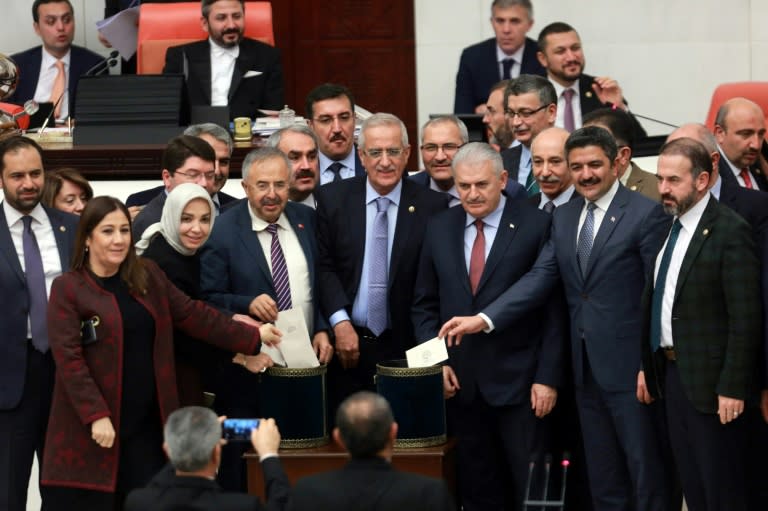Turkish MPs back new constitution bolstering Erdogan powers

The Turkish parliament on Sunday passed in a first reading a controversial bill bolstering the powers of the presidency under Recep Tayyip Erdogan that critics claim will lead to one-man rule. The parliament approved the two final sections of the 18-article new constitution after a marathon week of debating that began on January 9 and included sessions that often lasted late into the night. The ruling Justice and Development Party (AKP) mustered the necessary 330 or more votes -- a three-fifths majority -- needed for the adoption of the constitutional change and sending it to a referendum for final approval. The constitution plan will now go to a second reading in the Ankara parliament expected to start on Wednesday where the 18 articles will again be debated one by one. The debates have been fractious and last week saw some of the worst fighting seen in the parliament in years with punches thrown, deputies bloodied and one lawmaker even claiming to have been bitten in the leg. - No more prime minister - The proposed changes, which will create an executive presidency for the first time in modern Turkey, are controversial and far-reaching. The president will have the power to appoint and fire ministers, while the post of prime minister will be abolished for the first time in Turkey's history. Instead, there will a vice president, or possibly several. With Turkey already under a state of emergency for almost six months following the July 15 failed coup, the changes will also widen the scope of conditions in which the president can declare an emergency. Parliamentary elections and presidential ballots will be held simultaneously, with the draft giving November 3, 2019 as the poll date. The changes are opposed by the main opposition Republican People's Party (CHP). The third largest party, the pro-Kurdish Peoples' Democratic Party (HDP) is boycotting the vote. Meanwhile, a dozen HDP MPs, including the two co-leaders, are behind bars on charges of supporting Kurdish militants, accusations they claim are political, and cannot take part. The AKP, which has 317 seats in the 550-MP chamber, lacks the necessary three-fifths super majority. But the changes have won the support of most MPs from the fourth party, the Nationalist Movement Party (MHP). The MHP's enigmatic leader Devlet Bahceli, who took up the reins of the party in 1997, has emerged as the main ally of the AKP in the constitutional change. - 'Regime change?' - Opponents have accused Erdogan of marching towards authoritarian rule and seeking total control in the aftermath of the failed July 15 coup aimed at ousting him from power. "This is a regime change. They should not try to cheat the people," CHP leader Kemal Kilicdaroglu said, according to CNN Turk. "This structure will expose Turkey to much deeper problems," he added. But the authorities insist that the changes are needed to make government more efficient and would be little different to the presidential systems in the United States or France. "The constitutional changes will boost our country. God willing, no one will stand in the way of Turkey's new construction and rise," Erdogan said on Saturday. The current constitution, adopted in 1982 in the wake of the 1980 military coup, guarantees independence of the courts from an "organ, authority and office." But the approved changes will allow the president to directly intervene in the judiciary, which Erdogan has accused of being influenced by supporters of his ally-turned-foe, the Pennsylvania-based Islamic preacher Fethullah Gulen who is blamed for the July 15 putsch. Prime Minister Binali Yildirim said the new constitution would mean that Turkey would never again see a military coup. "With the constitutional reform, juntas will no longer be encouraged to take over power," he said. Prime minister from 2003 before becoming president in 2014, Erdogan has transformed Turkey in one-and-a-half decades in power, overseeing ambitious infrastructure projects and an industrial resurgence. But critics also accuse him of presiding over a creeping Islamisation and polarising to dangerous levels the country's diverse society.

